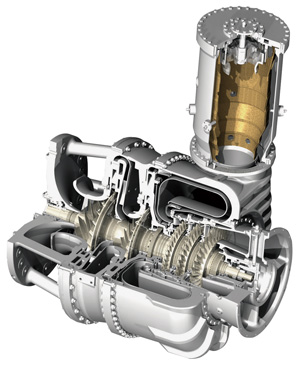Kawasaki Launches an Ultra Efficient Low-NOx Cogeneration System with Emergency Power Capabilities
Oct. 01, 2014

Tokyo, October 1, 2014 — Kawasaki Heavy Industries, Ltd. announced today that it has launched its newly developed PUC17D ultra efficient cogeneration system that can also supply power in emergency situations. The system is powered by a 1.7MW M1A-17D gas turbine developed by Kawasaki.
During normal operation, the PUC17D relies on utility gas or other gas fuel to supply electricity. When the supply of gas fuel is cut off during an outage, the system automatically switches to liquid fuel and continues to generate electricity to run critical equipment, such as emergency lighting systems. This highly efficient system eliminates the need to install a dedicated emergency power generator, meaning its benefits range from savings in space, initial costs and maintenance costs to a more streamlined equipment system.
The M1A-17D gas turbine boasts a rated electrical efficiency of 26.5%, the world's highest level in its class. To date, 22 units have been delivered since its launch in 2011.
The newly developed system features dry low emission (DLE)* combustion, which eliminates the need for water injection to the combustor. This combustion method helped reduce NOx emissions to 50 ppm at 0% O2. In addition, improved performance of the waste heat boiler boosted overall efficiency by 5.3 percentage points.
Catering to the needs for reduced environmental load, the DLE system is designed to respond to sudden fluctuations in load conditions and continue to operate with low NOx emissions even during stand-alone operation. Furthermore, the air intake duct has been fitted with a variable blade mechanism as an option. With this addition, the air-fuel ratio can be maintained at a fixed level during partial load operation, allowing DLE combustion to be applied to a broader range of low-NOx operation.
The Great East Japan Earthquake caused a level of damage far beyond previous expectations, dealing a severe blow to factories and other facilities. Businesses throughout Japan have responded to these events by establishing a business continuity plan (BCP) in preparation for major disasters. Such moves have increasingly drawn attention to cogeneration systems capable of supplying emergency power, primarily as a means to maintain the supply of electricity during an outage and to assist in disaster recovery. These systems also meet the needs of users overseas, where low-NOx, high-efficiency operation using gas fuel, and the ability to switch to liquid fuel when gas is in short supply, are both highly coveted features.
Kawasaki will continue to develop products that meet the needs of users around the world.
Contact
If you need more information about our business,
please feel free to contact us.





